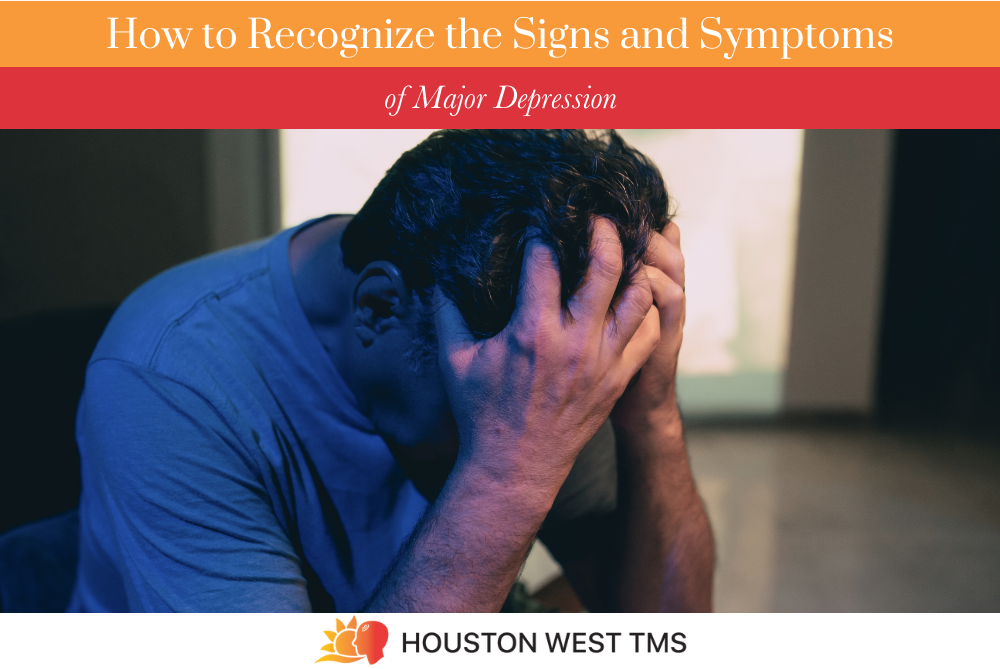 By Houston West TMS
By Houston West TMS
902 Frostwood Dr. Suite 283, Houston, TX 77024 | Phone: (713) 464-4455
Major Depression, also known as Major Depressive Disorder (MDD), is more than just feeling sad or having a bad day. It’s a serious mental health condition that affects how a person feels, thinks, and handles daily activities. Recognizing the signs early can be crucial for getting the help you or your loved one needs. At Houston West TMS, we specialize in non-invasive, medication-free solutions like Transcranial Magnetic Stimulation (TMS) to help those suffering from depression find hope and healing.
Understanding Major Depression
Depression is one of the most common mental health disorders in the United States. It affects millions of people each year, yet many suffer in silence due to stigma or simply not recognizing the symptoms. Knowing the signs of major depression can lead to early intervention, better outcomes, and a path to recovery.
Common Signs and Symptoms of Major Depression
Major Depression affects people differently, but common symptoms include:
1. Persistent Sadness or Low Mood
One of the hallmark signs of major depression is feeling sad, hopeless, or empty most of the day, nearly every day, for at least two weeks.
2. Loss of Interest or Pleasure
People with depression often lose interest in activities they once enjoyed—hobbies, social interactions, or even sex.
3. Changes in Appetite or Weight
This can manifest as either a significant weight gain or loss due to increased or decreased appetite.
4. Sleep Disturbances
Insomnia (difficulty sleeping) or hypersomnia (sleeping too much) are both common.
5. Fatigue or Loss of Energy
Feeling physically drained even after sleeping well is a common complaint among those with depression.
6. Feelings of Worthlessness or Guilt
People with depression may have persistent negative thoughts about themselves and feel excessive guilt or self-blame.
7. Difficulty Concentrating
Trouble focusing, making decisions, or remembering details can interfere with work, school, and relationships.
8. Irritability or Restlessness
Some individuals, especially men, may experience irritability or frustration over small matters.
9. Physical Aches and Pains
Unexplained physical issues—such as headaches, back pain, or digestive problems—can sometimes be rooted in depression.
10. Thoughts of Death or Suicide
In severe cases, individuals may think about or attempt suicide. This is a medical emergency and requires immediate intervention.
Who Is at Risk?
While anyone can develop depression, certain risk factors may increase susceptibility:
- Family history of depression or other mental health disorders
- Trauma or stressful life events
- Chronic illness or pain
- Substance abuse
- Hormonal changes (e.g., postpartum depression, menopause)
- Lack of social support
When to Seek Help
If you or someone you love is experiencing multiple symptoms for most of the day, nearly every day, for more than two weeks, it’s time to seek help. Depression is treatable, and there are many paths to recovery.
At Houston West TMS, we provide Transcranial Magnetic Stimulation (TMS)—a safe, FDA-approved, and drug-free treatment for individuals with Major Depression who have not found relief from traditional medication or therapy.
Frequently Asked Questions (FAQ)
Q: What is the difference between sadness and depression?
A: Sadness is a normal emotional response to a difficult situation and usually passes with time. Depression is persistent, affects daily life, and does not go away on its own.
Q: Can someone have depression without feeling sad?
A: Yes. Some people experience depression more through physical symptoms (like fatigue and pain), irritability, or cognitive changes rather than sadness.
Q: What should I do if I think I have depression?
A: The first step is to speak with a healthcare provider or mental health professional. They can assess your symptoms and recommend appropriate treatment options.
Q: Is Major Depression curable?
A: While not always curable in the traditional sense, many people recover fully with the right treatment. Depression can be effectively managed with therapy, medication, lifestyle changes, or advanced therapies like TMS.
Q: What is TMS and how does it help with depression?
A: Transcranial Magnetic Stimulation (TMS) uses magnetic pulses to stimulate specific areas of the brain associated with mood regulation. It’s non-invasive, painless, and has shown significant success for patients who haven’t responded to medications.
Q: Is TMS safe?
A: Yes. TMS is FDA-approved and has a strong safety profile. It does not require anesthesia and allows patients to resume daily activities immediately after treatment.
Q: How long does TMS treatment take?
A: A typical course involves daily sessions (Monday through Friday) for 4–6 weeks. Each session lasts about 20–30 minutes.
Compassionate Care at Houston West TMS
At Houston West TMS, we understand how debilitating Major Depression can be. Our experienced and compassionate team is here to guide you through your mental health journey with personalized care and innovative solutions like TMS therapy.
Contact Information
Houston West TMS
📍 902 Frostwood Dr. Suite 283, Houston, TX 77024
📞 Phone: (713) 464-4455
🌐 Visit us today to schedule a consultation and learn how we can help you or your loved one reclaim a life of wellness and balance.
Don’t suffer in silence. Help is here—and healing is possible.
